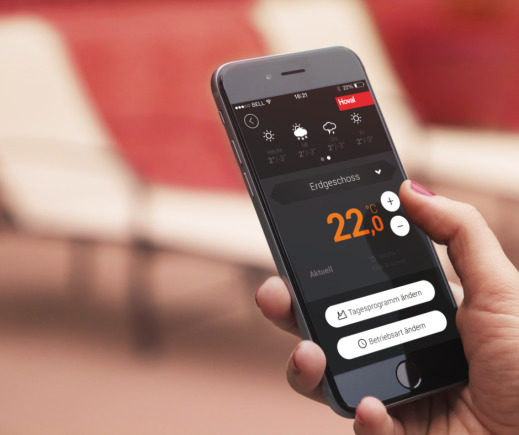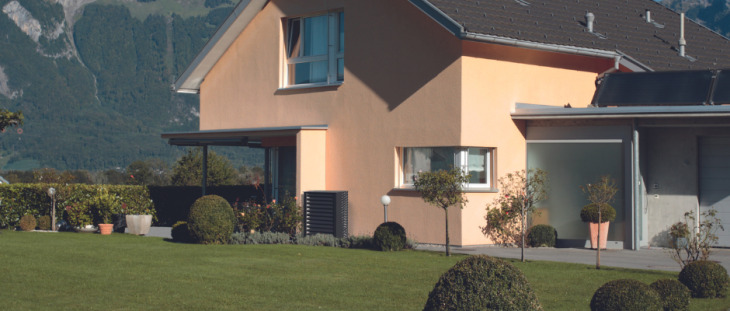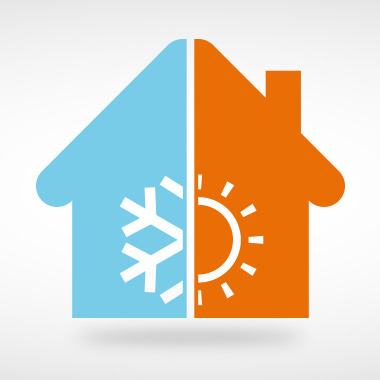Important considerations when buying a heat pump

Important considerations when buying a heat pump
Take the stress out of choosing your heat pump, by knowing what to expect, and what you want from it beforehand.
- Blog
- End customer - Investor
Many architects and designers are keen to install heating solutions that don’t stand in the way of sustainability. And that’s why we are seeing more and more buildings having their heating and hot water provided by heat pumps. However, choosing which type of heat pump to rely on is no mean feat. There are so many different criteria to factor in to ensure that you end up with the perfect solution – design, integration, and spacing requirements are just a few on an extremely extensive list. But if you consider all of the points below, you will be sure to find just what you need for your project in no time.

Space required – which heat pump will fit?
The top choice of heat pump for your home is ultimately going to come down to the space available in the building. Nowadays, particularly in London, we are seeing more and more buildings with extremely small amounts of space to install pumps and/or plant rooms, luckily, Hoval offer a wide range of tailor made solutions... so you're sure to find your perfect fit.
- A geothermal heat pump with an output of 7 kW requires a flat surface of around 300 m2. In this case, energy is extracted by surface collectors.
- The way energy is extracted by geothermal heat pumps with deep boreholes means that this solution saves on space, but you are faced with higher costs and more building work as a result.
- Roughly the same amount of space is required for water heat pumps, which require wells to be created. There are plenty of specific rules and regulations to follow here. For example, you will have to consider the distance between neighbouring wells and the depth of your own well. If you want to go down this route, you will need to get in touch with the local authorities for further information.
- Air source heat pumps have an outdoor unit, which means they take up less space. The fact that they are also easy to integrate makes them an ideal choice for renovation projects.

Noise – how loud should my air source heat pump be?
If you are leaning towards an air source heat pump, you’ll have to give some thought to the noise element.
The noise produced by a piece of technical equipment should not exceed an acceptable level, which varies from location to location, and building to building, with some areas requiring a very low level of noise. This is something to consider when choosing your heat pump, as they all make varying amounts of noise. Your local Hoval Area Sales Manager can help you with this.

Control – what should my heat pump offer?
Is the building your are specifying for going to be a smart building? Our heat pumps can be controlled by our TopTronic E app and wall mounted control!
It makes sense to think about whether you want the option of connecting your heat pump to the Internet too. After all, this connection is the only way of having diagnostics and troubleshooting performed remotely online in the event of a problem, for example. This means there is a reduced chance you would require an engineer to come to site in the event of an issue. If you are looking for a more cost-effective way of managing your heat pump, however, there are a number of alternative solutions for you to consider in advance. If you use the Hoval control system, you have the option of extracting the power needed for the heat pump without generating any emissions, such as by integrating a solar panel solution, or combining your heat pump with controlled ventilation.

Design – is it important to me that my heat pump has a modern design?
For many people, the external look of their heat pump is an important factor since they are investing a lot of time and money into new buildings.
In the case of air source heat pumps, the outdoor unit is usually placed outside for all to see, which is why many people choose the design carefully. If you can find an air source heat pump with a nice modern design, you can turn it into a feature rather than feeling the need to hide it away. If, however, the heat pump is going to be out of sight or if you’re simply not bothered about what it looks like, you can forget about the design altogether and save yourself some money.

Customer service – do I want help to be available 24/7?
One point that people often only think about when something hasn’t gone to plan is the availability of customer service.
For many customers, it is important that they can contact someone about their heat pump whenever they need to. After all, nobody wants to be sitting in the cold for days on end if something does go wrong. All we can suggest here is that you choose a provider who has a customer service team available 24/7. Investing in a unit that can be connected to the Internet also means that it can be accessed remotely. Problems can be fixed before you’ve even noticed that anything is wrong
Technology – what can my future heat pump do?
You will also need to consider the latest technology. At this point, you face an important decision between a modulating heat pump and a single-stage heat pump. Modulation means that the heat pump produces just the right amount of energy needed, with the heating system using the temperature outside as a point of reference. By way of contrast, a single-stage heat pump always operates at full power whenever heat is required. Even when a lower level of heat would suffice. This is similar to a unit working on the basis of an on/off system.

Cooling – should my heat pump take care of cooling as well as heating?
With our summers getting hotter and hotter, the demand for cooling solutions is on the rise. Lots of heat pumps come with the option of bringing rooms down to a nicely manageable temperature during the warmer parts of the year, with fan convectors distributing cool air into buildings. You can find out more about using heat pumps for cooling by clicking here.
Top questions to ask when buying a heat pump:
- How much space do I have available for my heat pump?
- What noise restrictions do I need to consider where I live?
- Am I bothered about the design of the heat pump?
- Would I like to have access to a customer service team 24/7?
- Do I want to be able to connect my heat pump to the Internet?
- Do I want my heat pump to adjust its output to the level of heating required?
- Do I want a single-stage heat pump or a modulating heat pump?
- Would I like my heat pump to double up as a cooling unit during the summer months?
